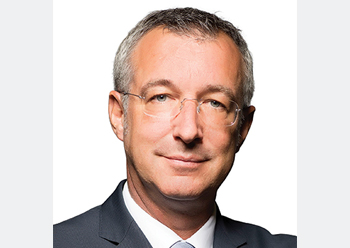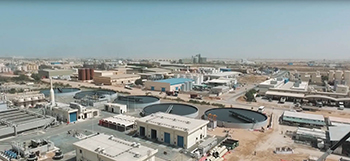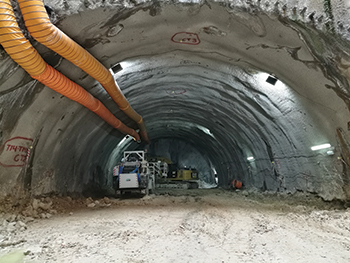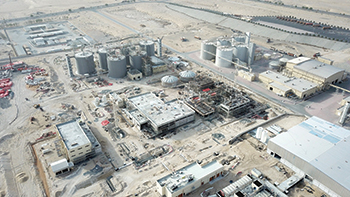Hi-tech solutions are ‘need of the hour’
Besix Concessions & Assets underlines the need to adopt disruptive technologies including the latest ceramic membranes to address the region’s depleting water resources.
01 October 2018
Besix Concessions & Assets is at the forefront of a technological advancement drive that aims to build a sustainable future for the world’s depleting water resources.
Its technologies and strategies can be better appreciated in water-scarce regions like the GCC, which is amongst the world’s largest consumers of water in both the residential and commercial segments.
It’s heartening to know that the Middle East has been spearheading a technology transition, driving the potable water production industry into application of new and competitive technologies, such as reverse osmosis, Rolf Richard Keil, project development manager at Besix Concessions & Assets tells ABDULAZIZ KHATTAK of Gulf Construction.
 |
|
Keil ... technological focus. |
He says: “The GCC and Middle East at large has always been on the forefront of looking for the best technologies. One good example is the takeover of reverse osmosis as the state-of-the-art desalination technology from thermal technologies. And one of the strong contenders for such technology disruption is the SiC (silicon carbide) ceramic membrane system of Cerafiltec, as a pre-treatment for SWRO (seawater reverse osmosis), as well as a replacement for traditional MBR (membrane bioreactor) and SBR (sequencing batch reactor) systems.”
Keil adds in view of the ever-growing competitiveness on the one hand, and increasing environmental awareness and regulations on the other, the only way forward is to stay ahead and develop sustainable innovative solutions, and allow these to be approved and applied in both greenfield and brownfield developments.
Besix, a pioneer in the wastewater treatment and management sector, offers state-of-the-art technologies applied in upstream seawater desalination, municipal and industrial waste water treatment and downstream treated sewage effluent (TSE) polishing for recycling, aquifer storage and reuse.
In addition, it is constantly searching for innovative new technologies and actively engaging in start-up support, acceleration, piloting and alliancing with such new technologies.
 |
|
Ajman sewage treatment plant ... among Besix’s first PPP projects. |
“One highlight in this regard are certainly ceramic membranes, which have developed to become not only commercially viable on capital expenditure (capex) considerations, but also offer a range of significant techno-commercial benefits from a total expenditure (totex) perspective, which we as a developer of public private partnerships (PPP) and build-operate-transfer (BOT) projects have on top of our list,” says Keil.
Some of the highlights of these new technologies, he says, are mainly clubbed around sustainability, such as durability, reliability and superior performance leading to lower energy consumption and higher recovery of the raw water to be treated, thus producing less waste in the process.
In addition, new technologies like SiC flat sheet ceramic membranes feature bacteria log removal and legionella filtration abilities that address imminent challenges in a very dynamic world of increasingly polluted natural ground and seawater resources, he says, adding many of the currently established technologies struggle to meet these challenges.
Elaborating on the green aspects of the SiC flat sheet ceramic membranes, Keil says: “The patented SiC ceramic flat sheet membranes feature not only the highest flux rates in the industry, but also the ability to reject effectively microbiological intake water content of concern, such as colloidal transparent exopolymer particles (c-TEP), which causes membrane bio-fouling, triggering increased use of chemicals and earlier replacement rates.
 |
|
Dubai Deep Storm Water System ... a key project being undertaken by the Besix Group. |
“The SiC ceramic membranes, developed by Cerafiltec of Germany, have an added value due to their special design housing, which is superior in modular design and resistant to operating challenges such as vibrations and corrosiveness of the waters to be treated. They also consume less energy, less chemicals, and require basically no replacement over 15 years and more.”
Keil says SiC ceramic membranes are being specified in many groundwater, municipal or industrial wastewater and desalination projects around the world – from the US to South Africa, the GCC to all across Asia.
“The ground-breaking for one of the largest volume market sectors, the seawater desalination, is on the brink of taking place. Small pilots have successfully been conducted in several parts of the world, including in the UAE, selecting the most challenging intake water conditions and environmental circumstances. Under strict supervision by reputed engineering consultants, testing laboratories and certification institutes from Germany, Canada and Singapore, these pilots have delivered extremely positive results,” he says.
Besix has undertaken several PPP projects in the region, with the first of such schemes having been developed and implemented in Ajman, with Ajman Sewerage Private Company (ASPCL) and Safi (a PPP with the Municipality of Ajman). Since then, Besix has ventured with further success stories in Abu Dhabi, with ISTP2 (Second Independent Sewage Treatment Plant Project), and most recently in Sharjah, with Qatra.
In addition, Besix was awarded the first SWRO plant project by Dubai Electricity and Water Authority (Dewa) earlier this year, entering the upstream potable water production market. All these projects are developed and delivered in partnership with both commercial, technical and public sector partners.
With regard to water challenges faced by the region, Keil outlines two factors here: depleting groundwater and polluted seawater resources. In addition, non-revenue water accounts for a substantial part of the economy from upstream potable water production to the point of use/sale, adding to the ratio of subsidies, he says.
He, however, adds these factors can be addressed immediately by an integrated water management system.
“The first step is for industrial water consumers to be allocated advanced TSE and single source, allowing a transition period equivalent to that provided on a PPP project timeline to develop and sustainably avail the required water quality and quantity for competitive and controlled industrial development.
“The second step is aquifer storage of seasonal surplus of advanced treated TSE, such as when the irrigation requirements are lower during the winter season – thus reducing the need to allocate expensive SWRO water for such use.
Headquartered in Belgium, Besix Concessions & Assets is part of the multidisciplinary Besix Group (founded in 1909). Besix specialises in construction, infrastructure and marine works, often in contracts with a high level of complexity. Its history in the Middle East extends over 50 years.
The synergies between the group’s entities enable it to create value for the customer that goes beyond just building. One feature that sets Besix apart in its industry is its in-house engineering department, with expertise in geotechnical engineering, concrete technology, methods and planning tools like building information modelling (BIM) and system engineering.
“By optimising our design work and then aligning the execution stage on it, we produce ‘value engineering’, minimising the risks and costs of failure, and optimising cost and implementation time for the client. It is in our DNA to bring every project we undertake, however challenging, to a successful conclusion. It is typically in difficult circumstances that we display our full creativity and flexibility to ensure a project’s success. At all times, we pay close attention to the most stringent safety regulations, which are a top priority for Besix,” he adds.
Business, Keil says, has been challenging, but very successful.
“The success of the Besix Concessions & Assets division lends the company the recurring revenue streams to weather a fluctuating construction sector, having delivered iconic projects, such as Burj Khalifa, Dubai Water Canal, Ferrari World and many more,” he says.
In addition, diversification of its activities and geography pays off by reducing its risk exposure, he concludes.
The Besix group employs about 14,000 employees and has an annual turnover of $3 billion.
- Hi-tech solutions are ‘need of the hour’
- Zurn offers smart, efficient systems
- Emerson meter is a diagnostic tool



